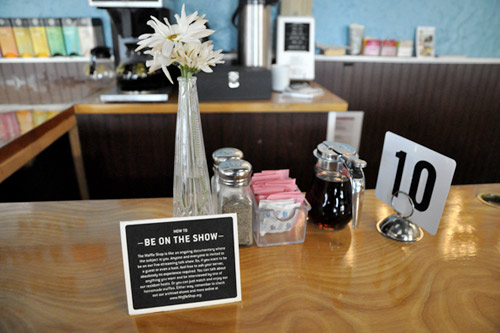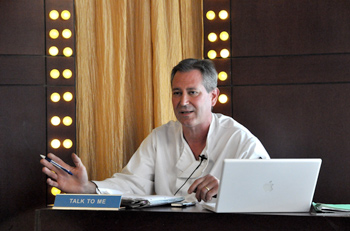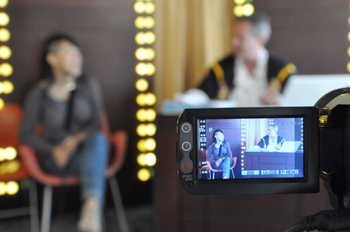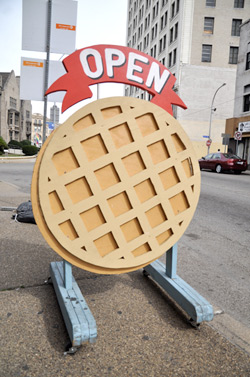 “Yes we really serve waffles. And you can be on our talk show, too.”
“Yes we really serve waffles. And you can be on our talk show, too.”
So reads the sign on the window of 124 South Highland Avenue in East Liberty. For those unfamiliar with The Waffle Shop the sign might provoke a confused second glance. The confusion only increases when stepping inside to enjoy a freshly made waffle, while another “customer” is being interviewed onstage before a camera about, say, the sexualization of furniture. Or Capitalism. Or skateboarding.
Jon Rubin, The Waffle Shop’s director and founder, believes this initial disorientation is part of what makes the restaurant/ talk show so engaging. “I think an interesting space opens up when people are a bit confused and off balance. It’s actually a pretty fertile area to introduce something new to someone,” says Rubin.
 Rubin is an Assistant Professor of Art at Carnegie Mellon University, whose art and classes explore the social dynamics of public spaces. Four years ago, he began teaching a class where students would creatively occupy vacant storefronts for one semester as a way of getting them to interact with their community, while developing context as artists.
Rubin is an Assistant Professor of Art at Carnegie Mellon University, whose art and classes explore the social dynamics of public spaces. Four years ago, he began teaching a class where students would creatively occupy vacant storefronts for one semester as a way of getting them to interact with their community, while developing context as artists.
In 2008, Rubin discovered a former tuxedo shop on a prime corner in East Liberty, which he found fruitful due to the built-in foot traffic streaming out of nearby bars, The Shadow Lounge and AVA. Rubin asked Shadow Lounge owner Justin Strong for advice on how to coax members of the community into the store. His response: “Stay open late and sell waffles,” a technique Strong had concocted to discourage late night patrons from wandering off in search of a snack.
Rubin, designer Brett Yasko, and Carnegie Mellon students transformed the space into a kind of hyper-real restaurant where guests and often unsuspecting waffle seekers watch anyone who is brave enough to be interviewed before the audience by a guest interviewer do so. The interviews are streamed live on The Waffle Shop website for the world’s enjoyment and intrigue. “After the first semester of starting this, I realized a couple of things. One is that we landed in a remarkable area that I wanted to stay in and explore further, because East Liberty is a real crossroads for a lot of different populations, socio-economically,” says Rubin. He decided to expand the project, hiring artist, CMU alum, and 15-year restaurant veteran Dawn Weleski.
 After two years, The Waffle Shop has become part of the fabric of the neighborhood, and what was once a quirky social experiment has acquired a more specific purpose. “We have a real stake and identity here,” says Rubin. “I view the project now as something of an ongoing social documentary, so I think what we’re doing is stimulating people who might not usually tell stories to tell them publicly.”
After two years, The Waffle Shop has become part of the fabric of the neighborhood, and what was once a quirky social experiment has acquired a more specific purpose. “We have a real stake and identity here,” says Rubin. “I view the project now as something of an ongoing social documentary, so I think what we’re doing is stimulating people who might not usually tell stories to tell them publicly.”
The Waffle Shop model works not just artistically, but economically. While CMU pays the rent and The East Liberty Development Corporation funded the giant rooftop billboard, 60 percent of The Waffle Shop’s funding comes from waffle sales. “We’ve become this sort of model that everyone’s after. How do you create a non-profit and for-profit combination model where you’re doing something that’s creative and has some kind of social impact, but also generates a revenue stream?” says Weleski. The Waffle Shop, open Friday and Saturday nights from 11 p.m. to 3 a.m., as well as Saturday and Sunday from 10 a.m. to 2 p.m., continues to operate as a popular CMU class. While Jon directs, and Dawn is responsible for managing the day-to-day operations of the restaurant, as well as its creative and business components, students play a vital role. In fact, they often play many roles, which can include anything from cooking, producing, filming, interviewing, serving food, marketing, conducting research, and editing episodes for permanent exhibition online.
Dawn points out how The Waffle Shop’s choice to allow various levels of participation, whether actually being interviewed, eating a waffle, or merely viewing online, permits a wide variety of personal interpretations about the project’s meaning. “The great thing about The Waffle Shop is that we don’t ask you to get anything out of it,” she says. “But because we’re asking people to participate in something, before they know it they’re performing and enjoying it. Whether they call it art or whether they know it’s a performance doesn’t matter. What they get out of it is what’s important.” Perhaps the freedom of interaction is the key to why The Waffle Shop continues to reveal new insights into the diverse, transitional character of the neighborhood and its residents.
 The Waffle Shop has introduced a number of special spin-off events and projects, the most successful being the much buzzed about Conflict Kitchen. Dawn, Jon, and fellow artist John Pena were motivated to come up with a takeout concept for the additional storefront located in The Waffle Shop’s kitchen after neighbor Justin Strong provoked some friendly competition with a hot dog street vendor. The three started naming countries that they wanted food from, and quickly realized that all of the countries they were naming, which didn’t already have a restaurant in Pittsburgh, happened to be in some form of conflict with the United States. That’s when the proverbial light bulb turned on.
The Waffle Shop has introduced a number of special spin-off events and projects, the most successful being the much buzzed about Conflict Kitchen. Dawn, Jon, and fellow artist John Pena were motivated to come up with a takeout concept for the additional storefront located in The Waffle Shop’s kitchen after neighbor Justin Strong provoked some friendly competition with a hot dog street vendor. The three started naming countries that they wanted food from, and quickly realized that all of the countries they were naming, which didn’t already have a restaurant in Pittsburgh, happened to be in some form of conflict with the United States. That’s when the proverbial light bulb turned on.
With a grant from The Sprout Fund, Conflict Kitchen opened last spring, utilizing politically knowledgeable CMU students to engage in conversation with people on the street about a specific nation, whose food they were serving, and whose government was embroiled in war, trade embargoes, or some other form of hostility with our own. The eatery began as Kubideh Kitchen, serving the Iranian kubideh sandwich, encased in a colorful wrapper that featured textual interviews with Iranians, both in Pittsburgh and Iran.
“It was an opportunity to introduce people who come to our takeout window to the daily life and culture of that country, and change the narrative that’s being constructed in the media. I’ve done work for the past two years with friends in Iran, so that’s why we decided to start with kubideh. I’m very concerned that the narrative we’re building about Iran, not just the government, but also the Iranian people, is very similar to what we did during the buildup to the war in Iraq. It’s this whole polarizing mythology in which you conflate one governmental policy with an entire population,” says Rubin.
Conflict Kitchen changes its culinary identity every four months, and Kubideh Kitchen is about to turn Afghan as Bolani Pazi, serving a flatbread treat loaded with veggies and yogurt. Plans are in the making for a live-feed screen that will connect Bolani customers to people in the lobby of a Kabul hotel.
The goals of Conflict Kitchen are at their core quite similar to those of The Waffle Shop. “They’re both trying to provide a forum for a public dialogue,” explains Weleski. “The Waffle Shop tries to stimulate any form of public dialogue, specifically about what’s happening locally. Conflict Kitchen provides a forum for public discussion about a very specific culture, and to locate that culture in Pittsburgh.” In the end, it’s all about harnessing the strange intersection of art, technology, and food to bring together different people and cultures that might not otherwise get to know one another.
John Farley is Development News and Buzz editor for Pop City. Send feedback here.
For more of Pittsburgh’s latest and greatest, sign up here to receive Pop City for free in your inbox every week.
Photos copyright Brian Cohen
